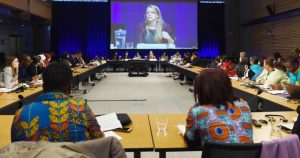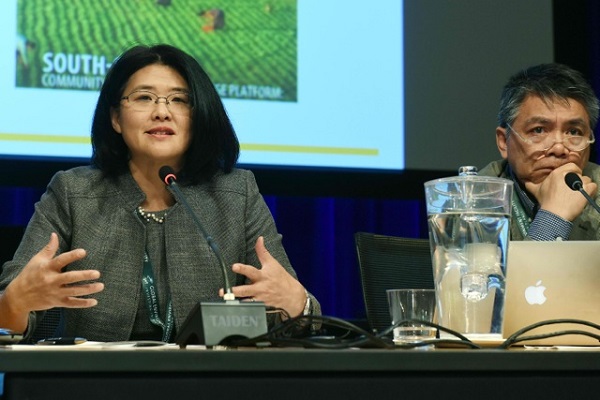First published on 12/17/2018, and last updated on 02/21/2019
By Jessica Campese, Advisor on issues of Governance and Human Rights for the ICCA Consortium
Sources: IISD summary, with additions from 55th Council documents and participant notes.
The ICCA Consortium joined Global Environmental Facility (GEF) CSO Network members at the 55th GEF Council Meeting and, CSO consultation held in Washington D.C. (17-20 December 2018).
The 5th ICCA Consortium Policy Brief (“Whose Inclusive Conservation?”) was prepared and circulated in advance of this GEF Council meeting. It notes that the term ‘inclusive conservation’ is used in the GEF 2018-2020 programme. It welcomes the focus on inclusion, while also highlighting the widely divergent views of what ‘conservation’ is and should be and, likewise, by and for whom it should be undertaken. The Brief then proposes a definition of ‘inclusive conservation’ and specific recommendations for legislators, policy makers and other conservation actors willing to pursue it. The Consortium engaged in the 55th GEF Council meetings in part to continue constructive dialogue and action towards conservation approaches in line with these recommendations.
CSO Consultation with the GEF Council (17 December 2018)
The GEF Council meeting was preceded by a CSO Consultation, which included representatives from civil society, GEF Council and Agencies, and the GEF Secretariat.

Sarah Wyatt of the GEF Secretariat speaks during the GEF Council Consultation Meeting with CSOs © IISD
Discussion topics included the following:
- In her remarks, the GEF CEO and Chairperson, Naoko Ishii, referred to the findings of two recent scientific reports on the rapid rates of climate change and biodiversity loss. She suggested that the GEF-7 programme offers critical pathways to address these trends, and highlighted the role of CSOs as change makers.
- Following a presentation on implementation of the Updated Vision to Enhance Civil Society Engagement with the GEF, panelists and participants raised several concerns, while also welcoming aspects of the Updated Vision. They noted, among other things, the need for stronger mechanisms and sufficient resources for CSOs’ and indigenous peoples’ engagement in GEF at national and regional levels and the need to respect indigenous peoples’ self-determination in decisions about who can attend GEF events.
- During a panel on CSO engagement in GEF-7, Yoko Watanabe (SGP), noted that the GEF-7 SGP will focus on “strategic partnerships/platforms for community-based actions; incubation of innovative solutions and risk taking; a focus on critical landscapes and seascapes for larger impacts; and a focus on social inclusion in maximizing global environmental benefits” (as summarized by IISDRS).
- During the same panel (on CSO engagement in GEF-7) Giovanni Reyes (National Coalition of Indigenous Peoples in the Philippines, GEF IPAG member, and ICCA Consortium Council Member) highlighted a GEF-funded initiative in which indigenous peoples in the Philippines are mapping their territories. He gave powerful remarks on the self-determined contributions of indigenous peoples to conservation, including in their ICCAs-territories of life, and shared the definition of ‘inclusive conservation’ proposed in the ICCA Consortium Policy Brief no. 5 (see above). His full remarks are shared in the link below.
- A large panel discussed connections between environmental conservation and gender equity, including the critical roles of women’s leadership and knowledge, as well as that of indigenous peoples and local communities, youth, allied men, and other community members. Panelists also spoke to the links between environmental sustainability, human health, and gender equity. They noted the need for GEF to proactively engage women, youth, and indigenous peoples and local communities, among others, including to learn from them. GEF Secretariat and UNDP then introduced the recent publication: ‘Women as Environmental Stewards: The Experience of the Small Grants Programme’.
55th GEF Council Meeting (18 – 20 December 2018)
Council Meeting agenda items that may be of interest for the ICCA Consortium and its members included the following:
- Discussion and Council Approval of an Updated Policy on Environmental and Social Safeguards (GEF/C.55/07) which supersedes the 2011 Policy on Agency Minimum Environmental and Social Safeguard Standards (GEF/C.41/10/Rev.01). This Updated Policy includes a number of changes that put stronger emphasis on, inter alia, non-discrimination and equity, stakeholder engagement, involuntary resettlement, indigenous peoples and FPIC, and [1] It also introduces monitoring of GEF Agencies’ compliance with the safeguards. At the same time, the CSO Network identified a number of issues for clarity or strengthening, including ensuring that the review and monitoring of safeguards compliance considers both Agency policy and practice, and is undertaken with the full and effective participation of involved and impacted indigenous peoples and local communities. Both the GEF CSO Network and a number of Council members raised concerns with the definition of indigenous peoples included in the Policy (and the CSO Network also raised concerns with the definition of FPIC). (The full text of CSO Network recommendations is included in the link below). The CSO Network requested that their comments be considered in the guidelines for implementation of the safeguards, to be developed by a multi-stakeholder Working Group on Environmental and Social Safeguards in the coming months. The Updated Policy will be in effect July 1, 2019 (applying first to all new programs and projects submitted for GEF financing on or after that date).
- Discussion and Council Approval of the new Policy on Access to Information (GEF/C.55/06), which applies specifically to GEF Council information (as access to Secretariat and Agency documents is addressed under separate policies). This new policy aims to ensure that GEF Council information is made proactively available or disclosed upon request in line with clear time lines (with some restrictions, set out in the policy). The CSO Network recommended, inter alia, that the Policy establish the communication procedure and instruments for requesting information.
- Discussion and Council approval of the first Work Program of GEF-7 (GEF/C.55/10), which includes 18 projects in 25 countries.
- Discussion and Council decision that the next two GEF CSO Consultations will focus on CSO and CBO experiences in plastics management (June 2019) and a civil society perspective on illegal wildlife trade (December 2019). (See document GEF/C.55/05).
Going forward…
Opportunities for engagement in GEF going forward include:
- The GEF webpage for CSOs notes a number of avenues for engagement, including information on how to comment on project proposals and make a complaint or raise a grievance concerning GEF projects
- You can also contact your GEF CSO Network Regional Focal Point (find them here).
- The GEF Secretariat noted that two CSO representatives will now be supported to attend GEF Expanded Constituency Workshops. These regional workshops bring together GEF focal points, focal points from the main Conventions (including UNCBD, UNFCCC, and UNCCD), representatives from GEF agencies, and representatives from CSOs to discuss country and regional programs. Information about applying for participation in these meetings in 2019 will be forthcoming from the CSO Network and the GEF.
- Guidelines for implementation of the Updated Policy on Environmental and Social Safeguards will be developed over the coming months. The Consortium hopes to be able to share information with members on opportunities to comment on these guidelines.
- As noted above, the next two GEF CSO Consultations will focus on CSO and CBO experiences in plastics management (June 2019) and a civil society perspective on illegal wildlife trade (December 2019). ICCA Consortium Members have rich experiences and insights they may wish to share in both cases, e.g., highlighting indigenous peoples’ and local communities’ leadership and contributions to combatting illegal wildlife trade and conserving wildlife. We will provide more information in the coming months about how you may be able to engage in these two meetings.
Looking for more about the 55th GEF Council Meeting and CSO Consultation?
- GEF webpage, with links to relevant materials including 55th Council agenda and related documents
- IISDRS Coverage of the 55th GEF Council and CSO Consultation, including:
Front picture: Yoko Watanabe (GEF Small Grants Programme) and Giovanni Reyes (National Coalition of Indigenous Peoples in the Philippines, GEF Indigenous Peoples Advisory Group Member, and ICCA Consortium Council Member) participate in a panel during the GEF CSO Consultation © IISD
